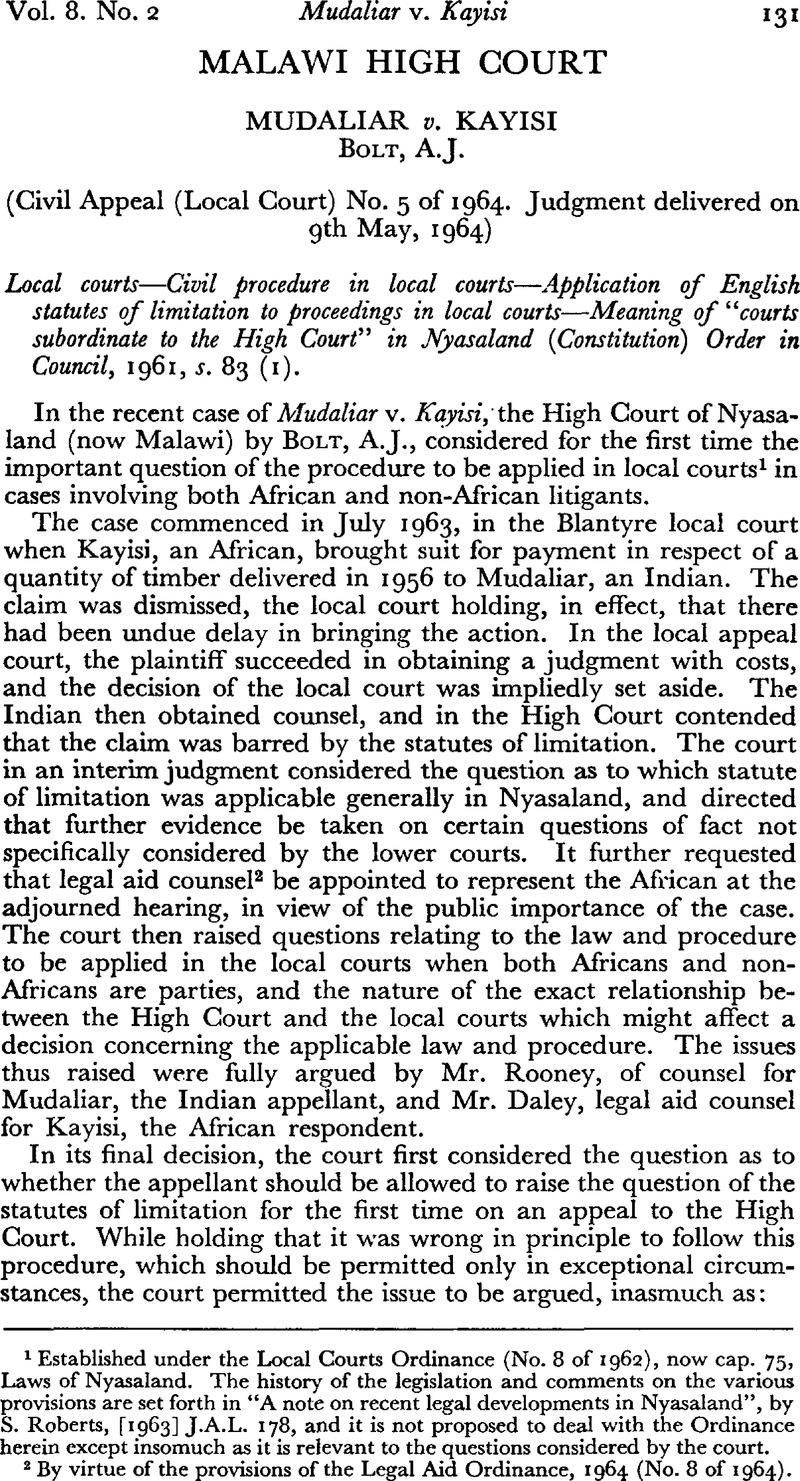No CrossRef data available.
Article contents
Abstract

- Type
- Cases
- Information
- Copyright
- Copyright © School of Oriental and African Studies 1964
References
1 Established under the Local Courts Ordinance (No. 8 of 1962), now cap. 75, Laws of Nyasaland. The history of the legislation and comments on the various provisions are set forth in “A note on recent legal developments in Nyasaland”, by S. Roberts, [1963] J.A.L. 178, and it is not proposed to deal with the Ordinance herein except insomuch as it is relevant to the questions considered by the court.
2 By virtue of the provisions of the Legal Aid Ordinance, 1964 (No. 8 of 1964).
3 The only procedure noted in the Local Courts (Procedure) Rules, 1962 is found in rule 13 (3), which reads as follows:
“(3) Every summons to a defendant in a civil cause shall state briefly the substance of the complainant's claim and the amount in dispute or the value of the subject matter of the claim. Such amount or value shall in no case exceed the amount in which the court has jurisdiction under the provisions of its warrant.”
4 “36. No proceedings in a local court and no summons, warrant, process, order or decree issued or made thereby shall be varied or declared void upon appeal or under the provisions of s. 31 solely by reason of any defect in procedure or want of form, and every court exercising appellate powers under this Ordinance, or the Local Courts Commissioner, as the case may be, shall decide all matters according to substantial justice without undue regard to technicalities.”
5 Author's italics.
6 L.C.O., s. 31.
7 “35. The hearing of every civil case shall be conducted in accordance with the procedure authorized by the African law and custom prevailing in the area of jurisdiction of the court…”
8 The Institute of Public Administration at Mpemba is engaged in the training of local court personnel, covering basic criminal and civil and criminal procedure as set forth in the Local Court (Procedure) Rules, 1962. These subjects form the major portion of the curriculum, but it remains true that the local court personnel are not given training in English law and procedure. This effort to train local court personnel is one major distinction between the old African courts and the present local courts, but the distinction drawn in the decision between magistrates’ courts and local courts remains valid.
9 “12. Subject to the provisions of this Ordinance, a local court shall administer—
…(d) the African law and custom prevailing in the area of the jurisdiction of the court, so far as it is not repugnant to justice or morality or inconsistent with the provisions of any Order of the Queen in Council, Act of Parliament or Ordinance in force in the Protectorate:”
10 See n. 7, above.
11 “8. …
Provided that notwithstanding anything contained in this or any other Ordinance, such jurisdiction shall, within the limits specified in the warrant of the court concerned, extend to the hearing and determination of suits for the recovery of civil debts due to the Nyasaland Government, to any municipal, town or district council or to any native authority under the provisions of any law:
Provided further that civil proceedings relating to immovable property shall be taken in the local court within the area of whose jurisdiction the property is situated.”
12 “12. Subject to the provisions of this Ordinance, a local court shall administer—
(a) the provisions of any Ordinance which the court is by or under such Ordinance authorized to administer;
(b) the provisions of any law which the court may be authorized to administer by an order of the Minister made under s. 13;
(c) the provisions of all rules, orders, regulations or by-laws made under the Local Government (District Councils) Ordinance or the Native Authority Ordinance and in force in the area of the jurisdiction of the court;
(d) …[see p. 135, n. 9].
13 There are, at present, three cases which have considered the problem of criminal procedure in local courts. Mangwiya v. R., Crim. App. No. 5 of 1963 (L.C.); Sumaili v. R., Crim. App. No. 7 of 1963 (L.C.); and Chipwanya v. R., Crim. App. No. 3 of 1963 (L.C.), which applies the provisions of s. 36 of the Ordinance to a case involving a defect in the particulars of a charge under s. 183B of the Penal Code, insulting language or conduct likely to cause a breach of the peace. All are, as yet, unreported.
In this connexion the author, in his capacity as law reporter at the High Court, is engaged in preparing for publication Vol. 1 of the Malawi Law Reports, an omnibus volume containing cases from 1923–1963 which still accurately reflect the law of the country. The cases cited above will be included. It is hoped that the volume will be available within the near future.


